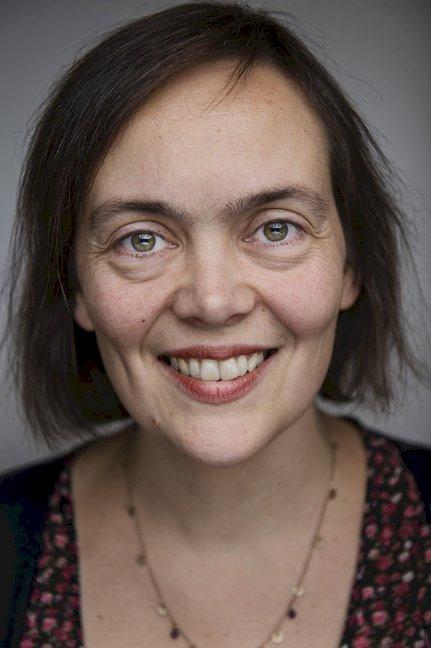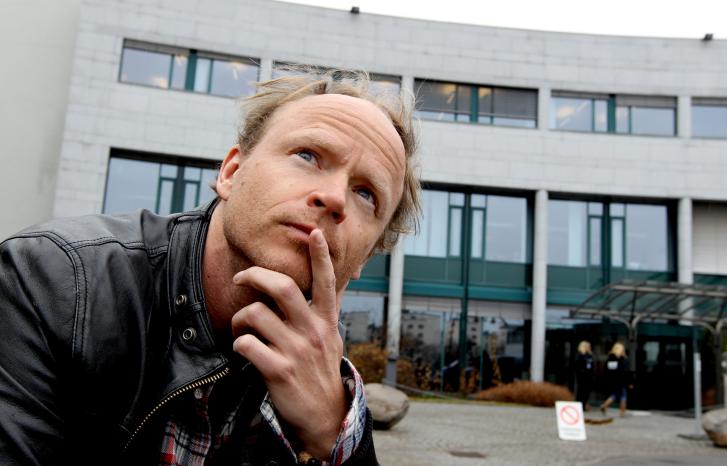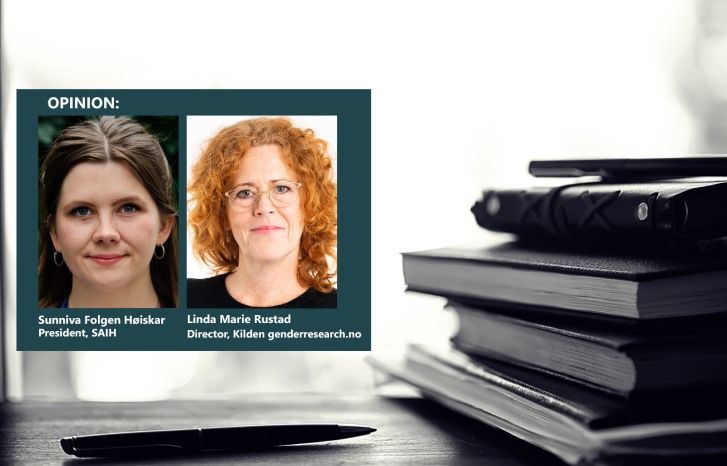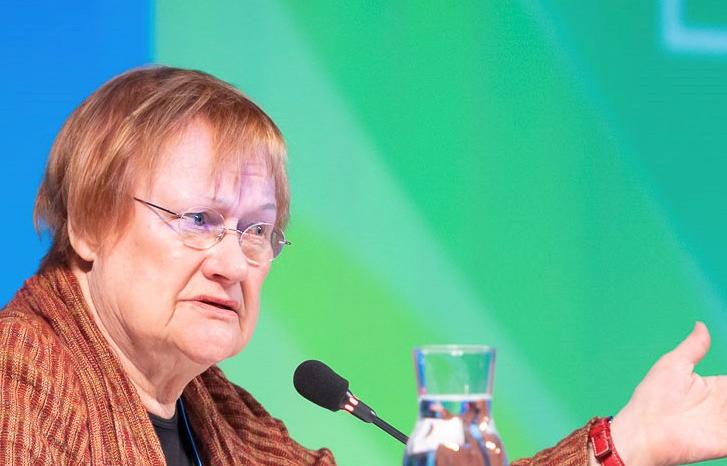“Knowledge is under strong pressure. It is therefore more important than ever that researchers participate in public debate,” says Marte Mangset.
Mangset is a sociologist and researcher at the Institute for Social Research (ISF) and associate professor at the Centre for the Study of Professions at OsloMet. In a new book, she and some of her ISF colleagues have studied how the organisation of academia and internal academic dividing lines affect freedom of expression.
Fear simplification of research findings
The report on freedom of expression in academia from 2021 identifies several factors that contribute to researchers’ reluctance to step into the public eye, whether it is being interviewed about their own research, commenting on political issues or participating in debates. The new book is based on in-depth-interviews Mangset and her colleagues carried out with researchers in the fields of gender, immigration and climate research.

“These are research topics that are particularly interesting to study in-depth. They are frequently the topic of debate in the media because they are politically controversial.”
The reason given by most researchers for why they hesitate to comment to the media is linked to what we call a tabloid media logic, Mangset says.
“This means that they refrain from making statements or disseminating their research through the media because they find that their research results are twisted or simplified in a manner that they cannot answer to,” she elaborates.
“Many of the researchers say that they have had uncomfortable experiences with the media that make them unwilling to be interviewed by any more journalists.”
Criticism from colleagues is most difficult
According to Mangset, another factor that impacts researchers’ participation in the public sphere is a fear of criticism and harassment.
“When they make public statements about their research, they are particularly worried about facing criticism from their own colleagues,” she says.
“It’s not quite as bad if people they don’t know criticise them. But if a professor in the field or another colleague says that the research is based on shaky grounds, it can be a heavy blow.”
This is why Mangset and her colleagues have also taken a closer look at internal dynamics in academia.
“We have studied how the funding structure and what confers merit affect researchers’ participation in the public sphere,” she says.
“There are no publication points to be had from commenting in the media or writing debate articles in newspapers. It also takes time away from other activities that count towards promotion and tenure, such as publication in prestigious journals.”
Academic conflict is an obstacle
Mangset also believes that academic conflicts within the research environments can affect the degree to which researchers make public statements.
“Internal conflicts may result in researchers hesitating to participate in public debate.”
The field of gender research is an example of this, Mangset believes.
“There is a distinction in gender research between researchers working with gender identity and those working with gender equality research,” she elaborates.
Some of the researchers we interviewed had experience of being frozen out by other colleagues and treated as antiquated.
She says that research on gender identity is more theory-based, whereas gender equality research is more empirical in nature and concerns e.g. differences between the genders in terms of pay and conditions in the labour market. There is also a distinction between those who research biological sex and those who research gender roles as they relate to culture and society.
“Such academic friction may lead to tough conflicts between researchers. It becomes a mix of academic and moral arguments, and the attacks are therefore perceived as very harsh,” Mangset emphasises.
“You risk being accused of being conservative and defending outdated gender roles or of not supporting transgender people. In addition, being on the “wrong” side of such academic dividing lines can reduce the possibility of having your research published.”
Gender equality research has a strong standing
Over the last few years, new trends in gender research have changed which parts of this research enjoy the highest status. It has also led to uncompromising antagonism between researchers and to many researchers in the field being reluctant to make public statements, Mangset believes.
“Today, gender equality research has a stronger position, whereas research on gender theory has traditionally been more dominant. This has also led to antagonism and conflict between researchers,” she says.
“Some of the researchers we interviewed had experience of being frozen out by other colleagues and treated as antiquated. But exactly what enjoys a high academic standing may vary from institution to institution and between different research environments.”
Important to be able to handle opposition
Another chapter in the book concerns how mixing research and politics can affect researchers” freedom to express themselves.
“There are more researchers who identify with the political left, which can make it difficult to participate in public debate,” says Mangset.
“Many researchers are labelled as political and dismissed as less credible.”
It’s important that managers support their staff, but that does not mean they have to endorse everything they say.
Most of the researchers who were interviewed, whether they researched climate issues, immigration or gender, were concerned with being able to withstand opposition and were prepared to handle criticism as long as it is fair.
“Public criticism of research can also be an important corrective and help to strengthen research, but it should address the issue at hand and not the person. And it should preferably not come from the researcher’s colleagues.”
“The debate surrounding the documentary series Hjernevask for example, hit gender research hard, both when it comes to individual researchers and the discipline as a whole. Several of our interviewees nevertheless believed that it ignited an academic debate which was important and necessary, even if they disagreed with the way it came about and found the journalism behind it to be biased.”
Hjernevask was a Norwegian documentary series that sparked a public discussion of the nature vs nurture debate.
Collegial support is important
There are examples of research environments that have helped to improve the debate climate, says Mangset.
“In climate research, support groups have been established to help colleagues who have been treated roughly by the media. They have also worked actively on preparing climate researchers to handle tough debates,” she says.
“Institutional changes have also helped to lower the conflict level. For example, funding schemes that require interdisciplinary cooperation have forced researchers who have ridiculed each other in the past to work together.”
But there should not be too much academic consensus either, Mangset warns.
“Having different schools of thought in the same discipline is not a problem. A diversity of perspectives is good for the development of the discipline, whereas too much agreement can be detrimental,” she says.
“It’s important that managers support their staff, but that does not mean they have to endorse everything they say.”
“It’s important to democracy that people in power aren’t the only ones who participate in public debate,” Mangset emphasises.
“When ordinary people have access to the same knowledge as those in power, they become better equipped to oppose them.”
Translated by Allegro språktjenester AS.
Kilden takes a closer look at the topic of academic freedom in our independent news magazine through several interviews with Nordic gender researchers on this topic. This is the first interview in the series.
- In 2021, the report Forskerne og offentligheten – om ytringsfrihet i akademia (‘Researchers and the public – about freedom of expression in academia’ – in Norwegian only) was published. It was written by Marte Mangset and Kjersti Thorbjørnsrud (Eds.), Arnfinn Haagensen Midtbøen, Dag Wollebæk and Audun Fladmoe from the Institute for Social Research (ISF).
- In April, the book Ytringsfrihet i en ny offentlighet. Grensene for debatt og rommet for kunnskap (‘Freedom of expression for a new public debate. The limits of debate and the room for knowledge’ – in Norwegian only) was published, edited by Marte Mangset and Kjersti Thorbjørnsrud. This article is based on three of the chapters in the book. Whereas the rest of the book is about freedom of expression in the broad sense, the three chapters concern freedom of expression and room for a diversity of perspectives in academia. The chapters are based on new empirical findings from surveys conducted among Norwegian researchers and in-depth interviews with researchers in the fields of gender and equality, immigration and the climate.
- The book is published as part of the monitor project on the status of freedom of expression in Norway 2020–22, initiated and funded by the Fritt Ord Foundation.



